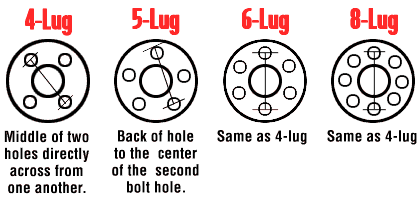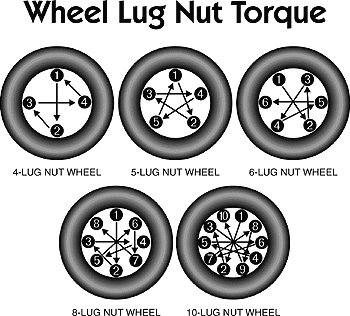Unlocking Your Car's Bolt Pattern: A Frugal Guide

Ever feel like you're throwing money away on unnecessary car expenses? You’re not alone. One area ripe for savings is knowing your car’s vital stats, like the lug nut pattern, also known as the bolt pattern. This seemingly small detail can prevent costly mistakes when buying new wheels and even save you in a roadside emergency.
Imagine this: you're on a road trip, hundreds of miles from home, and get a flat tire. You slap on the spare, only to discover the bolt pattern doesn't match. Suddenly, a minor inconvenience becomes a major headache, potentially costing you time and a hefty tow truck bill. Knowing how to identify your lug nut pattern empowers you to avoid this scenario and make informed decisions when purchasing new or used wheels.
So, what exactly is this mystical bolt pattern? It's simply the arrangement of the lug nuts or bolts that secure your wheel to the hub. It's expressed as two numbers: the number of lugs and the diameter of the circle they form. For example, a common pattern is 5x114.3, meaning five lugs arranged on a circle with a diameter of 114.3 millimeters. Knowing these numbers unlocks a world of affordable wheel options, both new and used, putting you in the driver's seat of your car expenses.
Determining your car’s bolt pattern isn’t rocket science. In fact, it's a simple process that can be done with a few basic tools. A ruler or measuring tape is generally sufficient for most vehicles. For more precise measurements, especially on vehicles with smaller or more closely spaced lugs, calipers can be helpful. With accurate measurements, you’ll avoid the frustration of purchasing incompatible wheels and ensure a proper fit, guaranteeing safety and optimal performance.
Historically, bolt patterns varied widely between manufacturers and even models. This lack of standardization made finding replacement wheels a challenge and could limit options. Over time, however, certain patterns became more common, streamlining the process. Knowing how to decode this critical information allows you to navigate the world of aftermarket wheels with confidence, opening doors to cost-effective upgrades and replacements without compromising safety or performance.
To determine a 4 or 6 lug bolt pattern, measure from the center of one lug nut to the center of the opposite lug nut. For 5 lug patterns, measure from the center of one lug nut to the outermost edge of the opposite lug hole. Convert this measurement to millimeters if necessary. This is the diameter of the bolt circle. Count the number of lugs and combine it with the diameter to get the complete bolt pattern. For instance, 5 lugs and a 114.3mm diameter create a 5x114.3 bolt pattern.
Benefits of knowing your lug nut pattern:
1. Cost Savings: Avoid buying the wrong wheels and save money by purchasing compatible used wheels.
2. Roadside Preparedness: Ensure your spare tire is compatible, preventing costly delays and tow truck fees.
3. Informed Choices: Confidently explore aftermarket wheel options, expanding your choices and allowing for personalized upgrades.
Step-by-Step Guide:
1. Secure your vehicle on a level surface.
2. Consult your owner’s manual for the bolt pattern (sometimes listed).
3. If not listed, locate a ruler or measuring tape (calipers for more precise measurements).
4. For even-numbered lug patterns, measure center-to-center of opposite lugs.
5. For odd-numbered patterns, measure from the lug center to the outer edge of the opposite lug hole.
6. Record the measurement (in millimeters) and the number of lugs.
Advantages and Disadvantages of Measuring Yourself
| Advantages | Disadvantages |
|---|---|
| Free and quick | Potential for inaccuracy |
| Empowering knowledge | Requires basic tools |
FAQs:
1. What tools do I need? A ruler or tape measure, calipers for more accuracy.
2. Is the bolt pattern the same for all cars? No, it varies.
3. Can I find my bolt pattern online? Yes, various resources exist.
4. What if my spare tire has a different bolt pattern? This can be dangerous, ensure compatibility.
5. Do I need to remove the wheel to measure the bolt pattern? No, generally not.
6. What if I measure incorrectly? Double-check your measurements.
7. Are there apps that can help? Yes, several apps can identify bolt patterns.
8. What happens if I use the wrong bolt pattern? The wheel won't fit properly and can be dangerous.
Tips and Tricks:
Clean the wheel hub for accurate measurements. Double-check your measurements. Consult online resources or forums for your specific vehicle model.
Knowing your car’s lug nut pattern is a small investment of time that pays off big. It's about more than just buying new wheels – it's about taking control of your car maintenance, avoiding unnecessary expenses, and being prepared for the unexpected. By understanding this simple concept and taking the time to measure your vehicle's bolt pattern accurately, you empower yourself to make informed decisions, saving money, and enjoying the peace of mind that comes with being prepared. So, grab your ruler, take a few minutes, and unlock the savings potential hidden within your car’s wheels. It’s a simple step towards a more frugal and empowered driving experience.
Transforming paint into stunning stone finishes
Harnessing the montana wind a guide to wind energy in the treasure state
Sherwin williams wall paint deep dive













